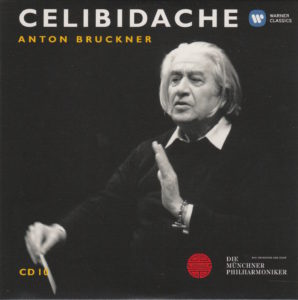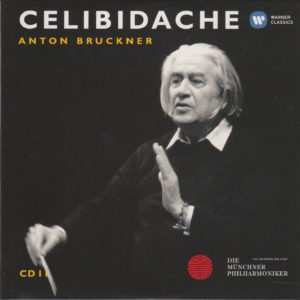 This morning, I am listening to Anton Bruckner’s Symphony No. 9 in D Minor (WAB 109), interpreted by the Romanian conductor Sergiu Celibidache (1912-1996).
This morning, I am listening to Anton Bruckner’s Symphony No. 9 in D Minor (WAB 109), interpreted by the Romanian conductor Sergiu Celibidache (1912-1996).
According to one web site, his name is pronounced: SER-zhoo Chay-lee-bee-DAH-ke.
If you want to read the background info on Maestro Celibidache (and I recommend it; he was a fascinating guy), or read my opinion of his interpretation of Bruckner’s Third, visit Day 13.
 If you want to read my opinion of Celibidache’s interpretation of Bruckner’s Fourth, visit Day 19.
If you want to read my opinion of Celibidache’s interpretation of Bruckner’s Fourth, visit Day 19.
If you want to read my opinion of Celibidache’s interpretation of Bruckner’s Fifth, visit Day 27.
If you want to read my opinion of Celibidache’s interpretation of Bruckner’s Sixth, visit Day 35.
If you want to read my opinion of Celibidache’s interpretation of Bruckner’s Seventh, visit Day 43.
If you want to read my opinion of Celibidache’s interpretation of Bruckner’s Eighth, visit Day 51.
If going backward isn’t your gig, then read on…
First, the objective stuff:
 Bruckner’s Symphony No. 9 in D Minor (WAB 109), composed 1887–1896 (unfinished)
Bruckner’s Symphony No. 9 in D Minor (WAB 109), composed 1887–1896 (unfinished)
Sergiu Celibidache conducts
Celibidache used the “ed. Nowak” version, according to the liner notes
Munchner Philharmoniker (Munich Philharmonic) plays
The symphony clocks in at 76:10 (Yikes!) spread over two CDs
This was recorded in Munich, Germany, on November 10, 1995
Celibidache was 83 when he conducted it
Bruckner was 72 when he died before finishing it
This recording was released on the Warner Classics label
Bruckner wrote his symphonies in four movements. He would have done so this time, as well, but he died before completing the Finale. The time breakdown of this one (Symphony No. 9 in D Minor), from this particular conductor (Celibidache) and this particular orchestra (Munchner Philharmoniker) is as follows:
I. Feierlich, misterioso………………………………………………………………………….32:26
II. Scherzo. Bewegt, lebhaft; Trio. Schnell………………………………………………………………………………………………….13:47
III. Adagio. Langsam, feierlich………………………………………………………………………………………………..30:37
IV. Finale: None……………………………………………………………………………………00:00
Total Time: 76:10 – Yikes! (bookended by applause; :57 at the start and 1.04 at the end)
Of the Nowak edition, its entry on Wikipedia tells us:
Nowak edition (1951)
This is a corrected reprint of the Orel edition of 1932.
Of the Orel edition, its entry on Wikipedia tells us:
Orel edition (1932)
This was the first edition that attempted to reproduce what Bruckner actually wrote. This version was first performed in 1932 by Siegmund von Hausegger with the Munich Philharmonic Orchestra. In the concert, the symphony was performed twice, first in Löwe’s edition and then in the Orel version. It includes only the first three complete movements.
Okay. Now, here are the subjective aspects:
My Rating:
Recording quality: 4
Overall musicianship: 4
CD liner notes: 3 (thin booklet mostly about Celibidache, with a wee bit about Bruckner, translated into English, German, and French – fascinating for me, but unfulfilling as a primer on Bruckner’s symphonies)
How does this make me feel: 3
Just to give you some idea of how long this unfinished symphony is in Celibidache’s hands, the first movement, alone, is over nine minutes longer than Barenboim’s with the Berliner Philharmoniker, and over eight minutes longer than Barenboim’s with the Staatskapelle Berlin. (Somebody must have told Celibidache that he was getting paid by the minute.)
And yet, both conductors used the same source material – the Nowak edition.
To what can I attribute that kind of difference?
Did Celibidache stretch out the tempo? Or did he use a version different from the ones Barenboim used even though the version listed is the same?
My guess – and I’m no expert – is that the tempo has been retarded.
As for the recording, it’s good. Not great. But good.
Too, it’s a good performance. Not great. But good.
I thought the first movement dragged. It seemed to take awhile to get to the point, to hook me.
And the Scherzo…
Way too slow.
As I’ve noted before, I’m not a musicologist. I couldn’t tell you how many beats per minute there are in this performance. The da-da-da-da-da-da-da…da-da-da-da-da-da-da part (3:22-) doesn’t sound triumphant here. It sounds plodding. Like, instead of soldiers marching boldly, their heads held high, this sounds like they’re slouching toward their destination, weary and beaten.
The end result of stretching out the tempo is that it changes the symphony by sucking out its energy. When I compare this to Barenboim’s interpretation (which is, after all, the point of this web site), I am left with the conclusion that Barenboim’s interpretation – despite charges that he is often too tame with his Bruckner – is more electrifying.
The third movement suffers from this stretching out, too – which means the all-important ending (the notes held long, the pizzicato punctuating and contributing to the feeling that this music is ascending to the heavens) doesn’t exist in contrast to what came before. By that, I mean other Adagio’s arrive at that stirring ending in such a way that it comes after greater energy, so that the ending is a release, a reprieve, an ascension – as if one’s spirit is floating toward heaven.
Celibidache is fine if you’re in the mood for grand, sweeping, lush interpretations. But if you’re looking for a jolt, or an ear worm that burrows in and stays there, I’m not sure Sergiu is your guy.
What’s historically interesting about this recording is the nine tracks beyond the third movement. They’re excerpts from rehearsals, which would be absolutely fascinating (and, probably, insightful) if I spoke German. The fact that these excerpts are in a language I don’t understand renders them merely interesting footnotes, mostly because they captured the famed Maestro’s voice. Now I know what he sounds like, and how he rehearsed with the orchestra.
However, the excerpts reveal something I’m not sure they were intended to reveal. (Or maybe so and that’s why they’re important to this performance.)
Track #5 is titled “When Then, When Then?” It’s an excerpt from the rehearsal of the Scherzo. Around the :57 mark Celbidache yells, “Tempo!” And the orchestra kicks it up a notch: da-da-da-da-da-da-da…da-da-da-da-da-da-da.
Yet, in the actual recorded performance of the Scherzo, the tempo at which he had the orchestra playing sounds much slower to me.
In other words, during rehearsals, Celibidache chastises the orchestra to maintain a stirring tempo. Yet, in the performance, the tempo seems to lag.
If he would have kept that same brisker tempo for the performance itself I probably would have really dug this recording.
Alas.
